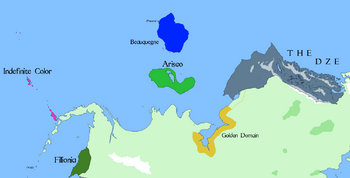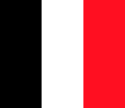Beauquegne: Difference between revisions
Villeneuve (talk | contribs) No edit summary |
Villeneuve (talk | contribs) No edit summary |
||
| Line 40: | Line 40: | ||
|official_languages = Beauqon | |official_languages = Beauqon | ||
|national_languages = Andegavenan, Langue des éventails, Langue des fleurs | |national_languages = Andegavenan, Langue des éventails, Langue des fleurs | ||
|regional_languages = Isaban | |regional_languages = Isaban, Carnot, Maubeuse, Vleten | ||
Carnot | |||
|languages_type = <!--Use to specify a further type of language, if not official, national or regional--> | |languages_type = <!--Use to specify a further type of language, if not official, national or regional--> | ||
|languages = <!--Languages of the further type--> | |languages = <!--Languages of the further type--> | ||
Revision as of 15:09, 25 July 2023
Most Jovial Principality of Beauquegne Principauté du Beauquegne (Beauqon) | |
|---|---|
| Motto: Fortune et justice (Fortune and fairness) | |
| Anthem: "Couronné d'étoiles" | |
 | |
| Location | Northern Pythia |
| Capital | La Bayonne |
| Largest | Maubourg-en-Fleuve |
| Official languages | Beauqon |
| Recognised national languages | Andegavenan, Langue des éventails, Langue des fleurs |
| Recognised regional languages | Isaban, Carnot, Maubeuse, Vleten |
| Religion | Church of the Lady of the Moon |
| Demonym(s) | Beauqon |
| Government | Constitutional Monarchy |
• Prince sovereign | Villeneuve V Pavot |
• First minister | Aphrodite Bourgeois |
| Legislature | Palace of Marguerite I Amoroza |
| Ballroom of Nobles | |
| Ballroom of Representatives | |
| Establishment | |
• Fall of the King-Tyrants | 575 AR |
• Unification of Fire and Steel | 1350 AR |
• Proclamation of Luna I | 1362 AR |
• Revolution of Roses | 1591 AR |
• The Great Compromise - Maubourg Accords | 1612 AR |
| Area | |
• | 1,954,470 sq mi (5,062,100 km2) |
| Population | |
• 1610 census | 21,325,610 |
| HDI (1610) | 0.901 very high |
| Currency | Silver Fleur (SFR) |
| Time zone | -9 |
| Calling code | +251 |
The most jovial Principality of Beauquegne, or Beauquegne in short, is a sovereign nation situated on Lys, an island belonging to the northernmost part of the Pythian continent separated from it by the (yet unnamed) sea. Beauquegne occupies the entire island of Lys, as well as several smaller islands on its southern coast.
Etymology
History
Fosacrist revolt
Fall of Theocratic rule and national splintering
Unification wars
Birth of the Principality
Plague of the silent death
Revolution of Roses
Geography
Landscape and rivers
Being an island nation, Beauquegne possesses no true neighbouring countries, however it lies in close proximity to the nations of the northern Pythian coast, as well as the island nation of Ariseo, all of which lie to the south of Beauquegne; Prestoria holds colonial possessions of an island to the north-east of Beauquegne, although the sovereignty over these islands is often disputed by the Beauqon government.
The five rivers of Beauquegne dominate the landscape of the island. They support the fertile western farmlands as well as the majority of the island's urban centres, such as La Bayonne and Maubourg-en- Beauquegne's main and largest island, Lys, possesses a diverse geography. Due to it's temperate climate, Much of higher lying land is covered in deciduous forest
Flora
Fauna
Culture
Religion
Government and Politics
Governance
National Government
Beauquegne is a constitutional monarchy, however unlike most other countries under the same system, the Prince/Princess of Beauquegne retains a wide range of powers and privileges as outlined in the Maubourg Accord of 1612. The Prince/Princess acts as head of both state and court, controlling both the executive and judiciary branches, although rule through executive ordinance is unpopular and rarely used. Control over the legislative branch of government is delegated onto the bicameral Palace of Marguerite I Amoroza, colloquially known as the "Court of love" serving as the nation's parliament. The lower house, the Ballroom of Representatives, is made up of 213 deputies elected by all citizens over the age of 20, and serve an electoral district of approximately 100,000. Political parties are forbidden by law, however deputies in both Ballrooms often form informal factions to achieve common aims. The higher house, the Ballroom of Nobles, serves a largely advisory role and amend drafted laws originating in the Ballroom of representatives. There is no defined number of seats in the Ballroom of Nobles, with numbers ranging from a hundred to over a thousand; the current session of the Palace is attended by 357 higher deputies. There are four categories of seats in the Ballroom of Nobles: Seats inherited, seats appointed, seats privileged and seats spiritual, which mark the justification of one's seat. Seats inherited are earned by right of nobility, seats appointed are given to experts in an individual's field or people of great achievements, seats privileged are given to representatives of settlements granted city rights, while seats spiritual are designated for representatives of the religious establishment. Only seats privileged are directly elected or chosen by people other than the Princely court; representatives of seats inherited, appointed and spiritual are selected by the Prince himself, on advise of the cabinet and the Princely family.
Law
Administrative subdivisions
Politics
Military
National Army
Beauqon Air Service
Beauqon Milice Service
Economy
Natural resources
Ore
Due to the mountain ranges concentrated in the north and east of the island, a large proportion of Beauquegne's economy derives from the mining sector, the vast majority of which is state-owned. Industrial resources such as coal, copper and iron are chiefly mined from the eastern mountain ranges, while the northern hills and mountains boast deposits of more valuable metals, such as silver and gold, as well as minerals, which are used in the National bank of Beauquegne to mint currency.

